Related Research Articles

The Centre for International Governance Innovation is an independent, non-partisan think tank on global governance. CIGI supports research, forms networks, advances policy debate and generates ideas for multilateral governance improvements. CIGI's interdisciplinary work includes collaboration with policy, business and academic communities around the world.
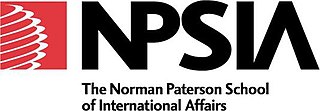
The Norman Paterson School of International Affairs is a professional school of international affairs at Carleton University that was founded in 1965. The school is based at Richcraft Hall on Carleton's campus in Ottawa, Ontario, Canada. Students, alumni and faculty of NPSIA are referred to as 'NPSIAns'.
George Norman Hillmer is a Canadian historian and is among the leading scholars on Canada–US relations.
The Bicesse Accords, also known as the Estoril Accords, laid out a transition to multi-party democracy in Angola under the supervision of the United Nations' UNAVEM II mission. President José Eduardo dos Santos of the MPLA and Jonas Savimbi of UNITA signed the accord in Lisbon, Portugal on May 31, 1991. UNITA rejected the official results of the 1992 presidential election as rigged and renewed their guerrilla war.
Jennifer Welsh is a Canadian writer, consultant, and professor, specializing in the field of international relations. Welsh has a Bachelor of Arts in Political Science and Economics from the University of Saskatchewan (1987). Welsh was named a Rhodes Scholar (1987) and completed a Master's and Doctorate in International Relations from the University of Oxford (1987-1992). From 1999 to 2014, Welsh was a professor in International Relations at the University of Oxford, where she also co-founded the Oxford Institute for Ethics, Law and Armed Conflict. From 2014 to 2019, Welsh was the chair in International Relations at the European University Institute (Florence), where she directed a five-year European Research Council project on the ethics and law of contemporary armed conflict. Welsh currently works as the Canada 150 Research Chair in Global Governance and Security at McGill University, is the Director of the Centre for International Peace and Security Studies and a co-director of the Canadian Research Network on Women Peace and Security. She is also a professor at the Max Bell School of Public Policy in Montreal, Quebec, and is a frequent commentator in Canadian media on foreign affairs.

David M. Malone, born in 1954, is a Canadian author on international security and development, as well as a career diplomat. He is a former president of the International Peace Institute, and a frequently quoted expert on international affairs, especially on Indian Foreign Policy and the work of the UN Security Council. He became president of the International Development Research Centre in 2008 and served until 2013. On 1 March 2013, he took up the position of UN Under-Secretary-General, Rector of the United Nations University, headquartered in Tokyo, Japan.
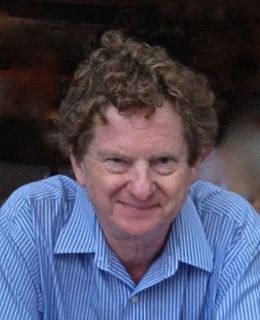
John James Kirton is a professor of political science and the director and co-founder of the G7 Research Group, co-director and founder of the G20 Research Group, founder and co-director of the Global Health Diplomacy Program, and founder and co-founder of the BRICS Research Group, all housed at the Munk School of Global Affairs at University of Trinity College in the University of Toronto. Since 2016, he has served as interim director of the International Relations Program at Trinity College in the University of Toronto.
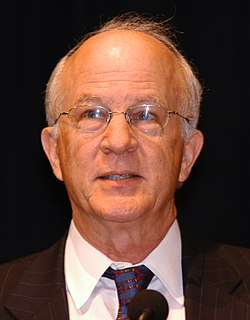
Chester Arthur Crocker is an American diplomat and scholar who served as Assistant Secretary of State for African Affairs from June 9, 1981, to April 21, 1989, in the Reagan administration. Crocker, architect of the U.S. policy of "constructive engagement" towards Southern Africa including apartheid-era South Africa, is credited with setting the terms of Namibian independence.
The Alvor Agreement, signed on 15 January 1975 in Alvor, Portugal, granted Angola independence from Portugal on 11 November and formally ended the 13-year-long Angolan War of Independence.

United Nations Security Council resolution 727, adopted unanimously on 8 January 1992, after reaffirming resolutions 713 (1991), 721 (1991), 724 (1991) and considering a report by the Secretary-General Boutros Boutros-Ghali, the council welcomed the recent signing of an agreement in Sarajevo regarding a ceasefire to the conflicts in the Socialist Federal Republic of Yugoslavia.
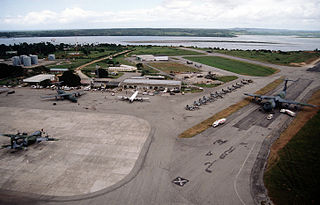
United Nations Security Council resolution 997, adopted unanimously on 9 June 1995, after reaffirming all resolutions on the situation in Rwanda, particularly resolutions 872 (1993), 912 (1994), 918 (1994), 925 (1994), 955 (1994) and 965 (1994), the Council extended the mandate of the United Nations Assistance Mission for Rwanda (UNAMIR) until 8 December 1995 and adjusted its operations from peacekeeping to confidence-building.
Daniel Drache is a scholar in Canadian and international political economy, globalization studies, communication studies, and cultural studies. He is recognized as having made important contributions to comparative and interdisciplinary debates on policy, globalization, border security, and the impact of new information and communication technologies on political mobilization and citizenship. He is also known for his critique of market fundamentalism. In Canada he is also credited with reviving the work of foundational political economist Harold Innis within the academy. Drache is a professor emeritus political science and senior research scholar of the Robarts Centre for Canadian Studies at York University in Toronto, Canada.

United Nations Security Council resolution 1446, adopted unanimously on 4 December 2002, after recalling all previous resolutions on the situation in Sierra Leone, particularly resolutions 1132 (1997), 1171 (1998), 1299 (2000), 1306 (2000) and 1385 (2001), the Council extended prohibitions relating to the import of rough diamonds not under the control of the Sierra Leonean government until 5 June 2003.

United Nations Security Council Resolution 1574, adopted unanimously at a meeting in Nairobi, Kenya, on 19 November 2004, after recalling resolutions 1547 (2004), 1556 (2004) and 1564 (2004), the council welcomed political efforts to resolve the conflicts in Sudan and reiterated its readiness to establish a mission to support the implementation of a Comprehensive Peace Agreement.
Joseph Camilleri is an Australian citizen of Maltese descent. He is a social scientist and philosopher. In philosophy he mostly specialised and interested in international relations.
Eric Helleiner is an author and Professor of Political Science and the Faculty of Arts Chair in International Political Economy at the University of Waterloo, and a Professor at the Balsillie School of International Affairs. He holds a Ph.D. and M.Sc. from the Department of International Relations of the London School of Economics, and received a B.A. in Economics and Political Science from the University of Toronto.
Kimberly Marten is an author and scholar specializing in international security, foreign policy, Russia, and environmental politics. She held the 5-year-term Ann Whitney Olin Professorship of Political Science at Barnard College from 2013 to 2018, and then returned to chair the Barnard Political Science Department for a second time from 2018-2021. Earlier she was the director of the Program on U.S.-Russia Relations at Columbia University’s Harriman Institute (2015–2019), and the Harriman Institute published a profile of her career. She is a member of the Council on Foreign Relations and the International Institute for Strategic Studies, and a frequent media commentator.
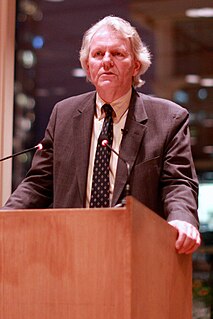
Michael J. Prince is a Canadian political scientist and public policy and administration scholar. Prince is the Lansdowne Professor of Social Policy at the University of Victoria in Canada.
Alice Wairimu Nderitu is the United Nations Special Adviser on the Prevention of Genocide to United Nations Secretary General António Guterres.
References
- ↑ "The top four risks for African economies in 2015: Will they swim or drown?". Mail & Guardian Africa.
- ↑ "Global group to look at ways to preserve internet freedom". CBC News.
- ↑ "Global Commission on Internet Governance". www.ourinternet.org.
- ↑ "Fen Hampson". Belfast Center. Retrieved 17 January 2014.
- ↑ "Internet governance group calls for more oversight of Web management". Globe and Mail.
- 1 2 Christopher John Kukucha; Duane Bratt (2007). Readings in Canadian Foreign Policy: Classic Debates and New Ideas. Oxford University Press. ISBN 978-0-19-542369-3.
- ↑ Steven C. Roach (24 August 2006). Politicizing the International Criminal Court: The Convergence of Politics, Ethics, and Law. Rowman & Littlefield Publishers. pp. 178–. ISBN 978-1-4616-4100-1.
- ↑ Julius Mutwol. Peace Agreements and Civil Wars in Africa. Cambria Press. pp. 32–. ISBN 978-1-62196-854-2.
- ↑ Ron Hirschbein (1 January 1997). What If They Gave a Crisis and Nobody Came?: Interpreting International Crises. Greenwood Publishing Group. pp. 9–. ISBN 978-0-275-96043-8.
- ↑ "The Hill Times’ list of the best 100 books in 2014". The Hill Times Online.
- ↑ "Rewiring Regional Security in a Fragmented World". United States Institute of Peace. Retrieved 17 January 2014.
- ↑ Crocker, Chester A.; Hampson, Fen Osler; Aall, Pamela, eds. (2021). Diplomacy and the Future of the World Order. Washington [D.C.]: Georgetown University Press. ISBN 9781647120931.
- ↑ Burney, Derek H.; Hampson, Fen Osler (2020). Braver Canada: Shaping Our Destiny in a Precarious World. Montreal [Quebec]: McGill-Queen's University Press. ISBN 9780228000921.
- ↑ Burney, Derek H.; Hampson, Fen Osler (August 2014). Brave New Canada. Montreal [Quebec]: McGill-Queen's University Press. ISBN 9780773543980.
- ↑ Andrew F. Cooper; Jorge Heine; Ramesh Thakur (28 March 2013). The Oxford Handbook of Modern Diplomacy. Oxford University Press. pp. 333–. ISBN 978-0-19-958886-2.
- ↑ Andrew Fenton Cooper; Richard A. Higgott; Kim Richard Nossal (1 January 1993). Relocating Middle Powers: Australia and Canada in a Changing World Order. UBC Press. pp. 223–. ISBN 978-0-7748-0450-9.